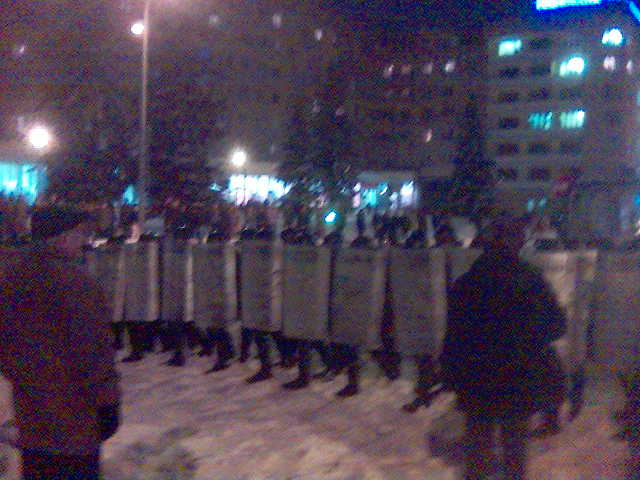
I witness: a diary of the Maidan
I witness
A novelist’s enlightening account of life in Kiev during Ukraine’s turmoil
The Economist | August 9th 2014
Ukraine Diaries: Dispatches from Kiev. By Andrey Kurkov. Translated by Sam Taylor. Harvill Secker; 262 pages; £9.99
SATIRISTS and surrealists are at once fortunate and challenged in the countries of the former Soviet Union. Their nefarious rulers and eventful politics volunteer themselves for parody, yet the lurid reality often outpaces satire and renders invention superfluous. Thus in his “Ukraine Diaries”—an account of the tumultuous past winter that saw his country’s president ousted and its territory dismembered—Andrey Kurkov whimsically imagines Russian tanks searching for the American commandos who are rumoured to have parachuted into western Ukraine. A few weeks later this fancy is superseded by events, as Russian forces do indeed invade, and Ukraine descends into chaos.
Best known for gently absurdist novels that combine affection for his region with deadpan despair—especially “Death and the Penguin”—Mr Kurkov lives in Kiev, close to Independence Square. That was the centre of the revolution that began last November when Viktor Yanukovych, then Ukraine’s president, rejected a trade deal with the European Union. The idea that the EU could inspire an uprising seemed odd to some observers; Mr Kurkov makes clear that, to Ukrainians weary of venal government, Europe represents the rule of law. His “Ukraine Diaries” contain his daily observations from November until April—by which time the Kremlin had annexed Crimea, and Ukrainian troops were engaging Russian proxies in the east.
One bonus of the diary form is dramatic irony: the reader, unlike the diarist, knows what will happen next. At one point, Mr Kurkov feels sure there will be no war, because those opposed to change are too apathetic to fight. By demonstrating that history is unpredictable, diaries such as his show that it is not inevitable: Ukraine’s rapid degeneration from protest to bloodshed was the result of a chain of errors, which Mr Kurkov’s entries chronicle. Mostly the errors were attributable to Mr Yanukovych, who, by trying to crush dissent, succeeded only in inflaming it.
But perhaps these diaries’ biggest service—one that only this sort of account can offer, more than compensating for the lack of hindsight—is to show how headline history intertwines with ordinary, private lives. “Life goes on,” Mr Kurkov says. “Not once has it stopped.” He drinks coffee and cognac with friends, one of whom gives him a vacuum cleaner. He juggles the demands of elderly parents and adolescent children. The family goes to the dacha for weekends. He struggles to concentrate on his new novel. Amid diplomatic and paramilitary manoeuvres, he organises a paintballing party for his son’s birthday. He takes his family for its annual winter holiday in Crimea, poignantly unaware that because of the annexation this will be their last. “I drove the children to school,” Mr Kurkov writes baldly one day in January, “then went to see the revolution.”
Mr Kurkov quickly adapts to the barricades: “Why does what seemed impossible or crazy before now seem logical?” Then the arrests and beatings escalate to abductions, torture and murder. Festive protests turn violent; instead of donated food, the protesters need bottles for Molotov cocktails. Rumours swirl: of troop movements and massacres, of the mining of metro stations. Thugs patrol the city with truncheons and guns. Russian-literature enthusiasts will be reminded of “The White Guard”, Mikhail Bulgakov’s novel of Kiev during the Russian civil war, and of Ivan Bunin’s journal of Odessa during that conflict. In mid-February, Mr Kurkov records, comes a “night of warfare” that “transformed the city centre to ruins”.
Increasingly this carnage crowds out the author’s personal life, though there is a nice vignette in which his daughter asks for extra pocket money, citing the spiralling inflation. Downtown Kiev, he joltingly notices, “looks like a paintball field”. Growing vegetables at the dacha begins to seem less a hobby than a necessity. Mr Kurkov sleeps badly; his eyesight suffers.
And as winter thaws, the focus of his ire shifts. To begin with it is directed at Mr Yanukovych, with his clumsy duplicity and flagrant corruption. “This country has never had such a stupid president,” Mr Kurkov concludes, “capable of radicalising one of the most tolerant populations in the world!” Or, more concisely: “Stupid bastard!” All the same, he is unsentimental about the revolutionaries, some of whom turn to score-settling and extortion. After Mr Yanukovych flees Kiev, however, and Russia’s insidious but deadly invasion begins, the main villain is Vladimir Putin. (The EU’s response is depressingly slow: “As if the news were arriving not by internet but by messengers on horseback.”)
For all their controlled rage and wry wit, nicely captured in Sam Taylor’s translation, Mr Kurkov’s diaries are valuable partly because of who he is. Born in Russia, he writes in Russian and considers himself Russian by background if not citizenship—though now he has “nothing in common with Russia and its politics”. He is an incarnation of a joint culture with a glorious but imperilled heritage. His book is a lament for Ukraine, but also, in the end, for Russia itself—as scarred by Mr Putin’s lies and larceny as Ukraine has been by his war.
Category: 6 - Reviews